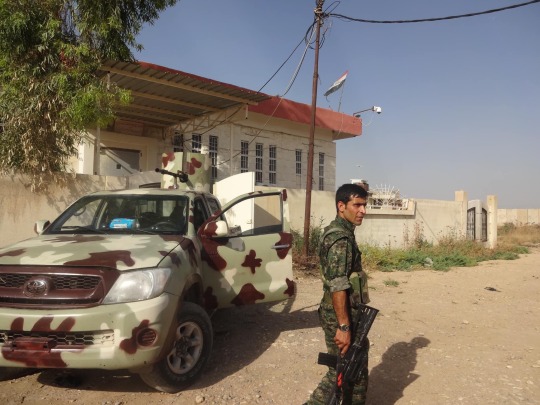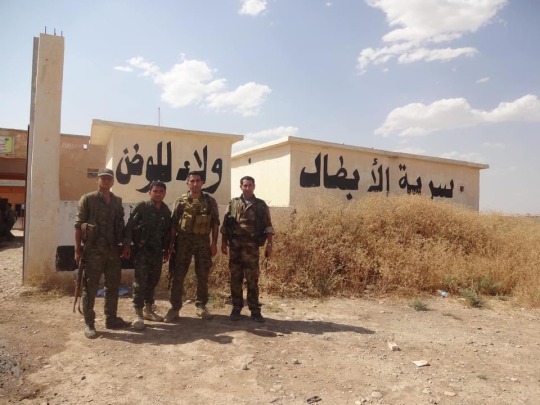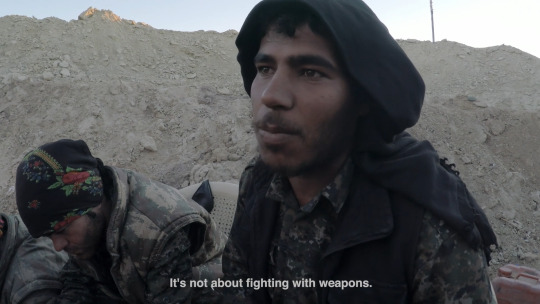#kurdish ypg
Explore tagged Tumblr posts
Text
Ten years ago on this day June 10 2014, tens of thousands of Iraqi soldiers, police and officers fled, leaving their weapons, ammunition, armored vehicles, headquarters and positions behind. We had to cross the border and take control of those areas to prevent ISIS from entering.
Mr.Polat Jan on X(+photos)
On yıl önceki bu gün 10 Haziran 2014'te on binlerce Iraklı asker, polis ve subay silahlarını, mühimmatlarını, zırhlı araçlarını, karargahlarını ve mevzilerini geride bırakarak kaçtı. IŞİD'in girmesini engellemek için sınırı geçmek ve bu bölgeleri kontrol altına almak zorundaydık.
X’ten sayın Polat Can(+fotolar)
10年前のこの日、2014年6月10日-何万人ものイラクの兵士-警察-将校が、武器-弾薬-装甲車-司令部-陣地を残して遁走した。
我々は国境を越え、ISの侵入を防ぐためにそれらの地域を制圧しなければならなかった。
Xよりポラト・ジャン氏(画像とも)



#kurds#kurdistan#kurdish#syrian kurds#sdf#kurdish ypg#ypj#ypg#سوريا syria#northern syria#war in syria#syria war
5 notes
·
View notes
Text








Nûdem Durak
‘Meet the Kurdish woman imprisoned in Turkey for singing.’ (2015)
10 notes
·
View notes
Text
A Letter To The Comrades In The SDF
My message, to the various groups of the SDF, who are as varied as life in the sea. To those who said you would stand up, and defend and get justice for the people of the coast. Will you comply with this treaty? Can you morally do that? Now with this treaty that the American Fascist Trump put on you, you will be allies with the same terrorists who helped kill your families years ago. The same terrorists who killed hundreds of innocent people in the coast. And will be forced to by proxy be allies with the fascist Turkish government that seeks the total annihilation of the Kurdish, Armenian, and Alawite peoples. This treaty in one signature signs away all you have fought. It signs away your dignity as humans to defend the revolutions you made, it signs away your dignity as humans to defend your homes, families, and people you swore to protect. It signs away the women's revolution of the YPG and others, it is very clear that this treaty in all terms was unacceptable. To collude with the enemy in this way should have been unthinkable. Yet your leaders signed it because they would rather listen to the fascists in DC rather than you. It wasn't unthinkable in fact to them it was acceptable and I am sure the rewards to your leaders will be bountiful as all you fought for is taken away. So to you who sacrificed everything, for years in fighting to define all that you love, do not let your so-called leaders sign it over to the enemy terrorist government in Damascus. Do not let them sign away all you worked for, all you fought for, all your comrades, your brothers and sisters died for. This is not the time to stand for peace when the enemy has guns to the heads of countless innocents! Now is the time to stand up for justice, for the innocent civilians who can't stand up for themselves. Stand there are the shield against the terrorist, fascist and now that it has been seen to be Trump's aim to disarm you to help the terrorist. Stand as a shield against the imperialists in Washington DC and Tel Aviv.
The most revolutionary endeavor is the hope for justice and peace, the offer made and the treaty signed today was not made in consideration of either. So to the comrades I address here do not stand for it. This is selling all the principles you have and all that you have left.
#anarchism#anarchocommunism#leftism#marxism#communism#palestine#apartheid#free palestine#syria#سوريا syria#sdf#kurdistan#kurdish#ypg#ultraleft#rojava#pkk
6 notes
·
View notes
Text
5 years Women Defend Rojava – We will continue our struggle with even more determination
In 2018, Turkey attacked and occupied Afrîn, and in 2019, Gîre Spi and Serêkanîye. In response, the Kurdish Women’s Movement (Kongra Star) called for international support. Since then, the campaign Women Defend Rojava gathers many internationalist solidarity activities with the Women’s Revolution and the people of Rojava.
For 5 years we have been organizing in more than 36 committees around the world. We have took actions, published leaflets, books and dossiers, we have organized education, information events and delegations.
Today again, the people of Syria and the whole Middle East are under attack. At a time when the destruction by capitalist patriarchy is intensifying and war is spreading all over the world Islamist gangs, fed by the Turkish state, are terrorizing the people and continuing the policies of genocide and feminicide. This attacks are against Rojava and our hope for peace in the Middle East.
https://womendefendrojava.net/en/2024/12/04/5-years-women-defend-rojava-we-will-continue-our-struggle-with-even-more-determination/
#rojava#videos#video#class war#human rights#animalrights#ypj#ypg#turkey#turkish#Afrîn#Gîre Spi#Serêkanîye#kurdistan#kurdish#Kongra Star#free syria#سوريا syria#syrian civil war#syrian refugees#syria#middle east#antinazi#antizionist#eat the rich#eat the fucking rich#anti colonialism#anti cop#anti colonization#ausgov
4 notes
·
View notes
Text


YPG guerrillas on fighting against ISIS.
Born From Urgency (2017)
69 notes
·
View notes
Text

Laniya Kalmasi !OC - Eileen’s Mother
#my oc#oc#ocs#moodboard#original character#harry potter#my ocs#female oc#harry potter oc#professor snape#snape#arab snape#parent snape#severus snape daughter#snape daughter#severus snape#kurdish character#kurd#kurdish#kurdish oc#kurdistan#Eileen Snape !oc#severus snape x oc#Severus Snape x female oc#ypg#Kurdish freedom fighters#women life freedom#mount ararat
5 notes
·
View notes
Text
Turkey threatens to attack Kurdish YPG if demands not met
Foreign Minister Hakan Fidan stated that Turkey would conduct a cross-border offensive in northeastern Syria against Kurdish YPG units if the group failed to meet demands.
Turkey considers the People’s Defence Units (YPG), which leads the Syrian Democratic Forces (SDF), a terrorist group linked to Kurdish militants engaged in a long-running insurgency against the Turkish state. Earlier, Ankara also asked the US, its NATO ally, to stop supporting the fighters.
Following the overthrow of former Syrian President Bashar al-Assad last month, Turkey demanded that the YPG disband. Ankara also demanded that non-Syrian YPG fighters and foreign terrorists leave Syria or be repatriated to their countries of origin, with its leaders surrendering to authorities.
Hakan Fidan said on Tuesday that Turkey believed the new Syrian authorities should address the issue of the YPG presence. He also promised that his country would do “whatever is necessary,” including “a military operation,” if the demands were not met.
Fidan, the first foreign minister to visit Damascus since the fall of Assad last month, claimed that Turkish President Recep Tayyip Erdoğan had ordered Turkish soldiers to take over prison-camps holding Islamic State fighters if the new Syrian leadership was unable to do so.
Read more HERE

0 notes
Text
France and Turkey’s Feuding Over Africa
France and Turkey’s Feuding Over Africa and how this is leading to over power both regionally and globally fighting for control
The Republic of France and the Republic of Turkey have not gotten along in the last few years, with the President of Turkey, Recep Tayyip Erdoğan, calling the president of the fifth French Republic, Emmanuel Macron, ‘brain-dead’. The big reason for this growing feuding and possibly rivalry is Turkey wishing to expand its influence in North Africa and sub-Saharan Africa at the expense of the…

View On WordPress
#ECOWAS#Emmanuel Macron#Geopolitics#Kurdish Separatist#Libyan conflict#Peter Zeihan#Recep Tayyip Erdogan#Syrian Civil War#YPG
0 notes
Note
if the rebels overthrow assad, what will happen to syria?
Syria will most likely turn into a Sunni Islamic emirate with a close relationship to the gulf states and Turkey, effectively turning Syria into a theocracy. This is (former Al-Nusra leader) Al-Joulani's aspirations for post-revolution Syria.
In other words, the country will look like another post-Gaddafi Libya with draconian laws.
The rebel groups are not a monolith, they are divided into many different groups, Wahabis, Salafis, other Sunnis, Secularists, Christians and many more, thus we will most likely see a continuation of the Civil war between Sunni Islamists and secular groups.
Re-emergence of ISIS in Syria.
Direct confrontation with the YPG and other SDF/Kurdish militias in Rojava and SDF-controlled areas.
Systemic oppression of religious minorities.
They will definitely concede the Golan Heights to the Settler state, lmao.
The Axis of Resistance will lose a major ally and Iran will lose a major supply route to Lebanon, which the Settler state will definitely appreciate as a major blow to the Shi'ite resistance.
Another US puppet state in SWANA.
393 notes
·
View notes
Text
10 points on the fall of Bashar al-Assad’s Syria from Vijay Prashad
1. The Syrian state had been devastated by the war from 2011 to 2014, and then by the sanctions placed on the country by the United States and its allies. The Syrian Arab Army (the official state army) had never fully recovered in the aftermath of the major fighting and was incapable of taking back the main cities of Hama, Homs, and Aleppo.
2. The Israeli bombardment of Syrian military facilities had weakened the Syrian armed forces’ logistical and ordinance capabilities. These attacks had been sustained and painful for the Syrian armed forces.
3. Israeli invasion of Lebanon and the assassination of Hezbollah leader Sayyed Hassan Nasrallah had weakened the ability of Hezbollah to operate even within Lebanon’s south, which forced the recent ‘ceasefire’ agreement with Israel. This demonstrated that Hezbollah was not in any position to enter Syria again to defend the Syrian government against any armed incursion on the Hama to Damascus road (highway M5).
4. The attacks on Iranian supply depots and military facilities in Syria as well as the attacks by Israel on Iran had prevented any build up of Iranian forces to defend the Syrian government. The weakening of Hezbollah also weakened Iran’s role in the region.
5. The nearly three years of conflict in Ukraine had certainly denied Syria the ability to call upon further Russian assistance for the protection of Damascus or for the Russian naval base in Latakia.
6. Therefore, Syria’s government no longer had its Iranian and Russian military allies for assistance against the reinforced rebels.
7. The Hayat Tahrir al-Sham, formed in 2017 out of the al-Qaeda formations, drew together various military forces from Turkey to the Uyghurs – with a large number of other al-Qaeda influenced fighters – and built up its forces in Idlib over the past decade. HTS has received aid and support from Turkey, but also covertly from Israel (this information came to me from a highly placed intelligence official in Turkey).
8. What will the new HTS-led government do regarding the many social minorities in Syria? What will the new HTS-led government do regarding the Golan Heights and Israel? How will the new HTS-government regard the Israeli military incursion in Quneitra?
9. This story is not over yet. There will be much further unrest in the country led by ISIS as well as the Kurdish groups in the north; already Turkish-backed groups are in combat against the Kurdish YPG (People’s Defense Units) and PKK (Kurdistan Workers’ Party) forces in Manbij; US forces are already in eastern Syria, where they say that they will remain as a buffer against ISIS (and will therefore retain control of the oil); Israel also announced that it took over the Golan buffer zone. There will be tension between the governments of Turkey and the US regarding what the new HTS-led government must, and must not do.
10. I hope very much that the statements made by Abu Mohammed al-Jolani, that retribution must not be the new culture, will come true. The real fear is regarding the treatment of the minority populations. There is no word yet if the militia groups in Iraq will enter Syria. Much of this depends on what happens to places such as the Sayyida Zaynab shrine in Damascus.
129 notes
·
View notes
Text
✹The comments from General Commander of the Syrian Democratic Forces Mazloum Abdi, who recently concluded a meeting with the representative of the Iraqi Kurdistan Autonomous Region Masoud Barzani, was released.
Image source/YPG Information (translation in Japanese by Dengên Cîhane û Kurdistane)
✹先日イラク・クルディスタン自治区マスード・バルザニ代表との会談を終えた、シリア民主軍マズルム・アブディ総司令官の談話が発表された。
画像原典/YPG インフォメーション(日本語訳:Dengên Cîhane û Kurdistane)
#kurds#kurdistan#news#kurdish#politics#sdf#syrian kurds#northern syria#iraq#kurdish ypg#ypg#ypj#سوريا syria
1 note
·
View note
Text
Mainblog: @destana-min
Silav u rez,
welcome on my page where I post mainly about Kurds and Kurdistan but also about West Asia and its population.
1 note
·
View note
Text
Brace Robert Belden is an American centre-left podcaster and union activist who volunteered to serve with the People's Protection Units (YPG), a Kurdish militia, in the Syrian Civil War. Belden is also widely known by his former Twitter handle, PissPigGranddad.
[...]
Commenting on the "pseudo-celebrity" he had acquired under that name, Belden said "I kind of wish I hadn't made my name PissPigGranddad. I picked it before I ever thought anyone would say it to me out loud."
74 notes
·
View notes
Text
Xelil Osman Hem, nicknamed Apê Nemir, known as a symbol of the Kobanê resistance, joined the caravans of the immortals today due to a heart attack.
The struggle for Kobanê is a symbol of the Rojava revolution. Apê (uncle) Nemir had a very special place in this struggle. After the attack on the northern Syrian city, Apê Nemir resisted the gangs of the so-called Islamic State (IS) together with the fighters of the YPG and YPJ.
Only thanks to the YPG/YPJ and fighters like Apê Nemir was it possible to defeat IS, which poses a threat to the whole world, in Kobanê.
#Xelil Osman Hem#Apê Nemir#videos#video#class war#kurdish#kurdistan#ypj#ypg#rojava#free syria#syrian civil war#سوريا syria#syrian refugees#syria#ausgov#politas#auspol#tasgov#taspol#australia#fuck neoliberals#neoliberal capitalism#anthony albanese#albanese government#antiauthoritarian#anti imperialism#anti colonialism#anti capitalism#antifascist
3 notes
·
View notes
Text
“We were like the living dead,” said the women of Raqqa while talking about the period when Raqqa was controlled by ISIS, adding, “The liberation of Raqqa was like a rebirth for us.”
This week marks the sixth anniversary of the liberation of Raqqa from ISIS. Long live the martyrs!
17 notes
·
View notes
Text

Anti-Fascist Internationalist Front
Anti-Junta rebel group in Myanmar comprised of veterans from the Kurdish YPG and other foreign volunteers.
36 notes
·
View notes